- Home
- William Styron
Lie Down in Darkness Page 5
Lie Down in Darkness Read online
Page 5
“… that’s the sister of my helpmate, if I might use the expression——” She paused and Loftis, languid eyes upon her, saw her lips compress abruptly in a look of derision and scorn. “You haven’t seen him, I guess, since I rarely if ever seen you in here before … the ninny,” she sneered, “well, pore thing, burdened as she was …”
Peyton—he saw her now: shape, form, substance; thinking of her in this way brought sudden fire to his chest. Lost now? Gone? Oh, that this moment should have never come, but would melt away like mist. My God, for a drink. Moving his arm upward, he became aware of a faint noise, as of paper crackling, in his breast pocket.
“Men,” the woman said. “Men!” she was saying. Blind, headlong, she talked on and on exhaustlessly above the droning fan, above the sound of water slowly dripping. The fly pivoted, buzzed away.
Ah, yes, the letter—he had forgotten. Before leaving the house an hour ago he had put it away without thought, fearfully, and now fearfully, with trembling fingers, he withdrew it from his pocket, examining the envelope: a green stamp upon which a three-masted schooner rested at anchor, commemorating something, obscured by the postmark’s sinuous inky lines. For an instant he laid the envelope on the counter, thinking: I just can’t. But then he opened it, saw six pages of writing, the familiar feminine script. … Something wrung his heart like hands as, tremulous, irresolute, he began to read——
Dearest Bunny, today I was 22 and I woke up this morning in a thunderstorm feeling so old—really sick, I guess—and then the money order came with your lovely nite letter (those telegraph people must think you’re my sweetheart) and I guess I feel better now. I went out and bought two quarts of milk and a Mozart concerto and I guess I feel better now. And I bought a lovely big alarm clock, too.
Bunny, you don’t know how much I miss you, how much that long lovely telegram meant to me. You get stewed to the gills and you try to be modern but you’re absolutely hopelessly conventional. Even so I love you and miss you terribly. I’ve really been so lonely since Harry left (has the news really gotten around town? What kind of poison’s being spread by the local you-knows? What has she said?) Dear Bunny, I suspect you’re the only one who understands and doesn’t too much care—from the gossip point of view anyway. Anyway, I am lonely, something I hate to admit but I guess it’s true. After you’ve lived with someone for a time it leaves a huge gap in your life when they’re gone—even if they’re impossible (so you think) or downright horrible (maybe you just think that too). Just feeling that sort of vacuum and silence around you when you’re cleaning the apartment or going to bed—that’s what’s so bad—even though if the person came back you’d slam the door in his face (not really).
So Bunny I just lay there last night and thought about you. New York is so beastly hot in the summer. I felt absolutely miserable. There’s a bar downstairs (I remember you haven’t seen this apt. since I moved up from the village) full of the loudest Italians imaginable. The juke box goes all the time full blast and of course it’s worse in the summer with all the windows open. Then with a pillow over my head I almost drifted off to sleep when the Cecchinos (he’s a dark and mustachioed (sp?) Latin type, a rather ominous young man) came in drunk—their apt. is across the hall—she shrieking at the top of her lungs and banging up against my door. So I just stayed awake until the bar closed listening to the busses go by and thinking thoughts. They weren’t very pleasant thoughts—in fact they were very dreary and morbid and depressing. They’ve just started lately it seems, I’ve had these moments before, but never for so long—and they’re absolutely terrible. The trouble is that they don’t—these thoughts—seem to have any distinctness or real point of reference. It’s more like some sort of black, terrible mistiness like the beginning of a disease, the way you know you feel when you’re catching the flu. I try to fight against this feeling all the time but in it seeps, and I can’t do anything about it at all. Thinking of you helps some, thinking of home—but I don’t know, nothing seems to really help for long. I feel adrift, as if I were drowning out in dark space somewhere without anything to pull me back to earth again. You’d think that feeling would be nice—drowning like that—but it isn’t. It’s terrible. Then when I see the birds it seems [something crossed out]
Oh, Daddy, I don’t know what’s wrong. I’ve tried to grow up—to be a good little girl, as you would say, but everywhere I turn I seem to walk deeper and deeper into some terrible despair. What’s wrong, Daddy? What’s wrong? Why is happiness such a precious thing? What have we done with our lives so that everywhere we turn—no matter how hard we try not to—we cause other people sorrow?
I’ve never talked to you like this, dearest. I don’t know why. I just want you to know these things. Please don’t be embarrassed.
It’s true. We’ve all been so unkind. I’ve been so unkind to people. It’s [something crossed out here.] wings it
(Later) I hate this city, Bunny. Everything is so false and brutal and ugly. But maybe that’s just me because I loved it so at first. The excitement, the students at the school—meeting Harry. He came back the other day to get some of his things. Everything was so terribly strained when he came in—I was in an absolute panic. I wondered—how could I have ever loved him? And yet I did love him once, I did very much. Wasn’t it maybe I who had been unkind, who broke us up after all? Yet I couldn’t admit it to myself at all—I just couldn’t. It was a hot day and I suppose we both felt badly so finally we exchanged words. I called him something horrible and banged out of the apt. When I came back later that evening he was gone and I could have died. Do I still love him, Daddy? Do I still love him? I don’t know. All I know is that something terrible is happening to me. Since I left the job I’ve been doing hardly anything, waking up late with the horrible hot noon sun in my face. I sit around and read and now and then I go for a walk. That’s about all. Isn’t it terrible, my telling you all these things? But I want you to know anyway.
Sometimes I see Laura—you remember her. We all went to the Vanguard that night. She’s very tiresome, but I envy her somehow. Maybe that’s the key to happiness—being sort of dumb, not wanting to know any of the answers.
I think of Maudie. Why did she have to die? Why do we have to die?
Oh, I miss you so, Daddy! I wish I could see you, talk to you and have you say nice things to me. I wish I could come home. I wish it were possible. Oh, Daddy, I wish I could come home! The birds are haunting me beyond all belief. Such wingless——
There was more but he read no further; it all became so crazy and confused. He placed the letter down gently, and gazed upward where a monstrous day-flying moth, crazed by light, whirled wildly around a dangling bulb.
“What’s the matter, mister?” Hazel said. Loftis didn’t answer her. “What’s the matter, mister?” Hazel repeated. “Isn’t there something I can do?”
He raised his eyes. “My daughter,” he said, with a look of hopeless appeal.
“Why, you pore man,” said Hazel.
Nothing now, he knew, could be changed at all. He put his head down on the counter and shut his eyes. Helen, come back to me.
“Why, you pore man,” said Hazel.
2
DOLLY BONNER descended the steps from the station dock, sidling down cautiously as if she thought high heels and tight jersey skirt might catapult her sprawling if she weren’t careful, and then hurried up to Barclay, who was still tinkering with the engine.
“Have you seen Mr. Loftis?” she said. “Where is he?”
The boy looked up suddenly and raised a startled arm toward the restaurant. Dolly had given him a terrible surprise. “Over there. Over there, ma’am,” he said. He closed the hood with a bang, for he had just seen Mr. Casper, standing by the baggage car with the remains, motioning him to bring the hearse over. The dust had lifted, although little eddies and swirls still lingered on the air; through one of these tiny clouds Dolly approached the restaurant, patting dust from her skirt. She heard the swollen notes of a mournful gui
tar; she peered in through the dusty window, shielding light from her eyes. Within, Loftis sat propped up over a cup of coffee, and the woman behind the counter opened and closed her mouth rapidly, soundlessly. Poor dear Milton. A rainbow of juke-box color enveloped the restaurant, a lovely spectrum endlessly shifting; a man with a deep, sad voice sang: “Take me back and try me one more time.” Such a hillbilly song, yet it filled her with gentle, genuine sorrow. Poor dear Milton.
She wiped dust from her face with a handkerchief, powdered her nose, and looked briefly at herself in the windowpane. She was a dark and pretty woman and would perhaps have been beautiful except for a slightly receding chin which lent to her features an expression not so much of weakness as fretfulness, as if at any moment her jaw and lips might tremble in sorrow, like a little girl’s. She had been much publicized for her social activities—Red Cross, the Women’s Club, and the like—and her picture, taken shortly after her wedding, had been printed in the local papers sometimes as often as twice a month for over a period of twenty years until finally even she sensed the impropriety of the cloche hat and bangs which had given rise to idle and secret laughter around town. So she had had the picture replaced, regretfully, with another, newer one in which there no longer blossomed the youthful smile, but which instead recorded with precision the small puffy folds beneath her eyes and her neck, too, flaccid and slightly wrinkled. Now she gave her nose one last loving pat and entered the restaurant.
She laid her hand softly on Loftis’ arm. “Dear, we’d better go now. Everything is ready and …”
“When the great Day of Judgment cometh,” Hazel was saying in a level voice, “you and her will enter unto the golden streets together. Don’t you worry, mister. That’s what the good book says. John eighteen thirty-six, ‘My kingdom is not of this world …’ ”
Loftis groaned, looking up at Dolly with frightened eyes. “You say everything’s ready?”
“Yes, dear. Come on, now.”
“This vale of tears,” Hazel continued, “is like unto the veriest smoke …”
“How much do I owe you?” Loftis asked.
“That’ll be five cents.”
Loftis laid a nickel on the counter.
“My heart goes out to you, mister. It truly does.”
“Thank you,” Loftis murmured. Automatically he opened the door for Dolly. They stepped out together into the street, where the dust had cleared away entirely, and the sun now shone brightly. The jukebox voice, trailing them with remote sadness, sang: “Take me back and try me one more time.” Far off, coal plunged seaward from the elevators, shaking the earth. Try me one more time.
Now, as they prepared to get into the limousine, Ella Swan labored down the steps from the dock and silently climbed into the back seat; the hearse came up, too, with sleek, privileged gravity and a dulcet honking noise, while pedestrians in its path scurried like beetles to the sidewalk. Dolly entered the limousine, then Loftis; the train, which was about to go back to Richmond, made a doleful blast on its whistle and Mr. Casper got out of the hearse and paused benignly at the limousine door, like a bishop about to consecrate something.
“All righty,” he said, peering into the back seat. “Is everybody ready?” He smiled wanly. “Ah, I see. All right, we’ll go now.”
So they were off at last—Dolly and Loftis next to each other, Ella Swan on the jump seat sitting stiffly in black silk and rococo lace, her head bowed now in some old posture of contemplation or sorrow, saying nothing, and Mr. Casper in the front seat, starting the motor: Loftis could see his freckled brow and red hair in the little mirror. Yet they had gone no more than a hundred yards, trailing the hearse, when the hearse itself swerved toward the curb, stopped, and Barclay issued forth with a harried look, beckoning to Mr. Casper.
“Oh dear,” said Dolly, “oh dear.”
“What’s wrong——” Loftis began, bending forward, but Mr. Casper had stopped the limousine, got out and walked to the hearse where, with Barclay, he began to hold parley over the engine.
“Oh, my God,” Loftis said, to no one in particular. “Isn’t it enough that I’ve got all this, without something else going haywire?” He thrust his head in his hand. “Jesus. It’s more than I can bear.”
Dolly laid her hand on his arm. “You’ve got to be brave, Milton,” she said.
He raised his head without answering and gazed at the hearse. He turned away with a sudden shock, for inside, in that tasseled, becur-tained gloom, he had caught a glimpse of the coffin, receptacle of all his love, which with panic he realized must today disappear forever. It was really, he thought, more than he could bear. He turned completely away from the hearse and craned his neck so that he could see the bay. Dolly murmured something softly consoling, harmless and incoherent; he ignored this, thinking: Jesus, she’s getting on my nerves. Up ahead the motor in the hearse gave a sinister belch, throbbed feebly, and perished in an asthmatic gasp; for a moment blue smoke billowed through the limousine, then faded on the air. Jesus, he thought: This is more than I can stand. By the seawall, where he turned his gaze, overlooking the bay, there was a little patch of grass and a sycamore tree: beneath the tree a colored boy and his girl were tussling. She made a grab for him, laughing; her mouth was big, open; round with wild delight: “Git on!” the boy cried, and they tumbled together beneath a scrawny little bush, then lay still. Summer-time. Light lay serenely over the bay. A herd of oyster boats was anchored far out; like cows they all faced in one direction: like cows, too, almost imperceptibly, they turned—with the changing of the wind. Above, around the vast circumference of the sky, a pale light was reflected, glowing in bright oblong patches against those clouds that hovered motionless on the horizon. It was a bright and sticky light, somehow menacing; it filled him obscurely with a feeling of storm and threat and coming destruction. Oh, God, he thought, shivering a little: What will I be doing tomorrow?
He must have sighed then, unconsciously, made a noise; perhaps he did, for once more he felt Dolly’s soft gloved hand on his, the voice saying tenderly, “I’m with you, dear. I’m here. Don’t worry, I’m with you.”
He looked at her and tried to smile. “I don’t feel very well,” he said. He remembered the scene in the restaurant and his belly heaved. “This is the worst thing that ever happened to me.”
“Dear,” she said, “you’ll just have to be brave.” Her eyes glistened in sympathy, together with pure rapt adoration, the familiar expression which she wore, when near him, with mindless constancy.
“I was sick,” he said.
“Oh dear,” she exclaimed. “Oh, my darling.”
“I vomited. Bile came up. I’d go to bed. Any other day.”
“Oh, my poor darling.” Again she rested her hand on his, and in a willful, irritable gesture he drew his hand away. In the past he would have devoured her sentiment, would have basked sunnily in this warm atmosphere of devotion. During the last few years he had relied upon her steadfast gaze of love and longing, perhaps unconsciously enough, as one among the assortment of props and crutches—along with all the whisky, and with Peyton—which supported him against the unthinkable notion that life was not rich and purposeful and full of rewards. That face, that gaze, that adoring glance, he had believed, were nearly reward enough. She was submissive and she worshiped him, and it was for those reasons that he had loved her. It had been that way from the beginning: he talked and she listened, while through this curious interplay of self-esteem and self-effacement there ran an undercurrent of emotion they were both obliged to call love.
Now, however, just as it had during the past few months, her presence had begun to worry him, depress him; each word she said somehow left him more and more unstrung. He wished he hadn’t brought her with him. It had only been cowardice anyway, he reflected, that prompted him to go by for her this morning, when Helen had refused him. He had wanted company, that was all; he had needed so to talk to someone.
“What’s wrong, dear?” she said. He glanced at her. She looked hurt
, hurt because he had drawn his hand away.
“What’s wrong?” he said. “Oh, God, now really …” He looked away.
“Yes,” she said gently. “Yes, darling. Of course. I understand. I just wish I could say something to make you feel better.” She groped in her handbag for a handkerchief and dabbed at her eyes. “There’s nothing,” she concluded, “that you can say at a time like this.”
He didn’t answer. It had begun to get fiercely hot in the limousine. Silently Ella Swan ran a hand over her forehead. A smell of salt and tar lingered on the air, rankly suggestive of sea, heat, stagnation. He crossed his legs, uncrossed them, and unaccountably sneezed: would they never fix that motor? There was a dim clanking sound; at the front of the hearse he could see Mr. Casper’s rear, clad in shiny black, bent over the fender.
“Anything you try to say at a time like this,” Dolly added, “sounds so inappropriate.” She paused. “Somehow.”
Please be quiet. Just hush.
A huge truck swung around the corner, roared past toward the station, heavily vibrating. On its side there were big red letters.
SCANNELL
Hogsheads of tobacco bobbed high above. The truck disappeared behind them, leaving an odor of tobacco, faintly acrid. Once more the hood of the hearse went down with a crash. Mr. Casper stood erect and wiped his hands. Barclay got in and started the engine; it made a fitful, hacking noise, like a dog coughing up a bone, then caught; an umbrella of blue smoke rose to the heavens and Barclay waved his arm valiantly out of the window. Mr. Casper returned with a distressed look and climbed back into the front seat. The hearse moved ahead.

 Selected Letters of William Styron
Selected Letters of William Styron A Tidewater Morning
A Tidewater Morning Sophie's Choice
Sophie's Choice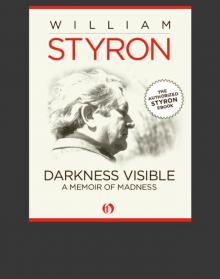 Darkness Visible: A Memoir of Madness
Darkness Visible: A Memoir of Madness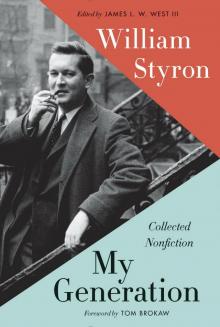 My Generation: Collected Nonfiction
My Generation: Collected Nonfiction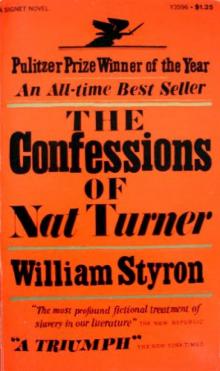 The Confessions of Nat Turner
The Confessions of Nat Turner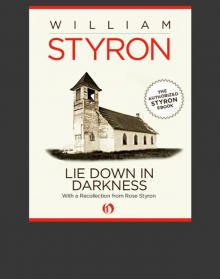 Lie Down in Darkness
Lie Down in Darkness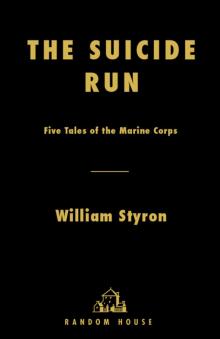 The Suicide Run: Five Tales of the Marine Corps
The Suicide Run: Five Tales of the Marine Corps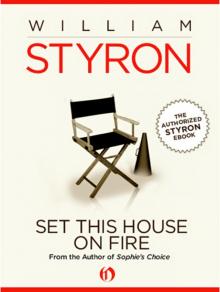 Set This House on Fire
Set This House on Fire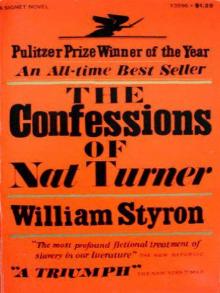 Confessions of Nat Turner
Confessions of Nat Turner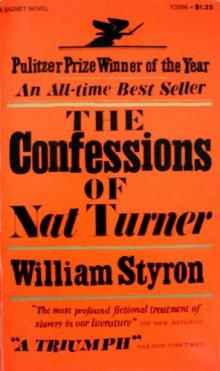 The Confessions of Nat Turner (1968 Pulitzer Prize)
The Confessions of Nat Turner (1968 Pulitzer Prize)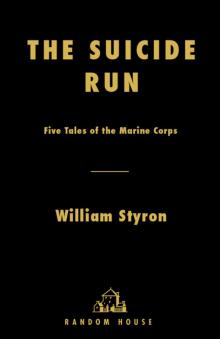 The Suicide Run
The Suicide Run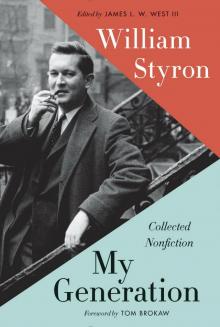 My Generation
My Generation Sophie's Choice (Open Road)
Sophie's Choice (Open Road)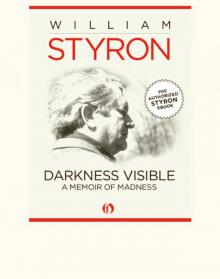 Darkness Visible
Darkness Visible